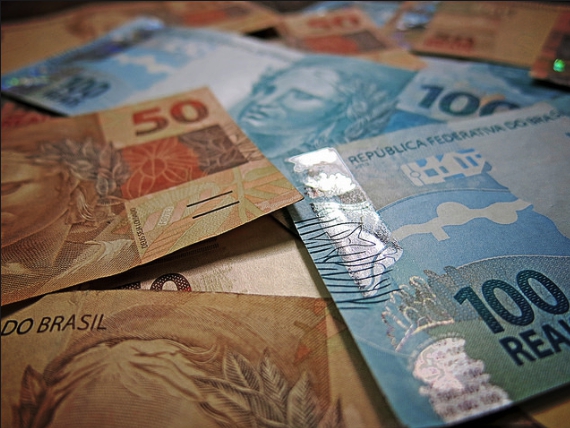Standard & Poor’s said it may cut Brazil’s credit rating to junk, citing the country’s political and economic challenges amid an ongoing corruption probe. The ratings company revised the outlook on Brazil’s rating to negative from stable. The country’s rating from S&P is already at BBB-, the lowest investment grade.
The ratings move adds to challenges for President Dilma Rousseff and her economic team led by Finance Minister Joaquim Levy as they duel with Congress to shore up fiscal accounts at the same time the country slips into recession. Expanding corruption investigations of politicians and companies jeopardize the government’s efforts to adopt policies that could help Brazil preserve its investment-grade rating, S&P said.
S&P believes there is a “greater than one-in-three likelihood that the policy correction will face further slippage given fluid political dynamics and that the return to a firmer growth trajectory will take longer than expected,” according to their statement.
The portfolio management team of the Aberdeen Global Brazil Bond commented that Brazilian sovereigns were looking on the cheap side since Standard &Poor’s made its announcement. “We note that Brazil is now trading flat to the likes of Serbia & Croatia, two countries with higher Debt/GDP, a lack of willingness to commit to fiscal consolidation and poor growth prospects, which makes their debt dynamics even worse than Brazil’s”
Edwin Gutierrez, lead portfolio manager of the Aberdeen’s fixed income strategy in Brazil, commented that they do not believe that the downgrade from investment grade will happen this year. They believe that all three ratings agencies will have Brazil´s sovereign debt at the equivalent of BBB- and negative outlook by year end. However, they foresee a fairly highly risk of a downgrade from one or more of the agencies in 2016.
Gutierrez added that by the time the downgrade to junk bond happens, the event will be fully priced in, so the impact will be fairly minimal. “Brazilian Credit Default Swaps have actually tightened in, which reflects Aberdeen´s perception that Brazil sovereign debt is already trading at BB levels”.
Standard & Poor’s now expects the contraction in real GDP to be deeper and longer. Their projections are for a 2% contraction this year followed by no growth in 2016, before returning to modest growth in 2017. Brazil’s growth prospects are believed to be below that of its peers.
For Franklin Templeton Fixed Income’s team, it became clear that some action from Standard & Poor’s would be taken, once the government announced that the target for the fiscal primary surplus was being lowered for the next three years. The fact that the change in the outlook happened sooner than expected, has bought Brazil some time in order to try to avoid the downgrade to junk bond.
Although Brazilian CDS are already pricing Brazilian sovereign debt below investment grade rating, Franklin Templeton believes that Brazil is very far from a systemic crisis, which makes some Brazilian assets very attractive at the moment, such as nominal or real rates local currency denominated government bonds.
Franklin Templeton believes that a downgrade before year end is not likely. “The agency stressed that further deterioration in the political environment could jeopardize the approval of the needed measures to keep the fiscal adjustment on track. The sharp depreciation of the Brazilian real, together with the fear of higher inflation and economic chaos will probably trigger politicians well known sense of survival”.
Brazilian Financial Services companies
Standard & Poor’s Ratings Services revised the global scale outlook on eleven Brazilian financial services companies (Banco Bradesco S.A., Itau Unibanco Holding S.A., Itau Unibanco S.A., Banco Citibank S.A., Banco do Brasil S.A, Banco do Estado do Rio Grande do Sul S.A., Banco Santander Brasil S.A., Banco do Nordeste do Brasil S.A., BM&FBOVESPA S.A-Bolsa de Valores, Mercadorias e Futuros, Banco Nacional de Desenvolvimento Economico e Social, and Caixa Economica Federal) to negative from stable following the same rating action on the Federative Republic of Brazil.
At the same time, the national scale outlooks on fourteen entities was revised to negative from stable (Banco Volkswagen S.A., Banco Bradesco S.A., Bradesco Capitalizacao S.A., Itau Unibanco Holding S.A, Itau Unibanco S.A., Banco BNP Paribas Brasil S.A., Banco Citibank S.A., Banco de Tokyo-Mitsubishi UFJ Brasil S.A., Ativos S.A. Securitizadora de Creditos Financeiros, Banco do Estado do Rio Grande do Sul S.A., Banco Morgan Stanley S.A., Banco Santander Brasil S.A., Banco Toyota do Brasil S.A., and Banco do Nordeste do Brasil S.A.). Standard & Poor’s also affirmed the long-term and short-term ratings for all the entities.
The agency rarely rate financial services companies above the sovereign long-term rating because, during sovereign stress, the sovereign’s regulatory and supervisory powers may restrict a bank’s or financial system’s flexibility, and because banks are affected by many of the same economic factors that cause sovereign stress.
Fitch and Moody’sare maintaining their Brazil’s sovereing debt rating at BBB and Baa2 respectively, two notches above the speculative debt level. Back in April, Fitch also revised Brazil’s sovereign debt outlook, due to the poor performance of the economy, the growing macroeconomic imbalances, the fiscal budget deterioration, and the increase in government debt.


 By Fórmate a Fondo
By Fórmate a Fondo
 By Alicia Miguel Serrano
By Alicia Miguel Serrano